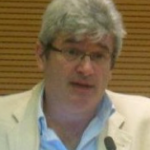The 12th International Workshop on Frontiers in Availability, Reliability and Security
to be held in conjunction with the 12th International Conference on Availability, Reliability and Security
(ARES 2017 – http://www.ares-conference.eu )
August 29 – September 1, 2017, Reggio Calabria, Italy
FARES establishes an in-depth academic platform to exchange novel theories, designs, applications and on-going research results among researchers and practitioners in different Computing Dependability aspects which emphasize the Practical Issues in Availability, Reliability and Security.
Topics of interest comprise but are not limited to:
|
Reliability Models and Failure Prevention
|
Survivability of Computing Systems
|
Important Dates
| Submission Deadline | May 1, 2017 |
| Author Notification | May 24, 2017 |
| Proceedings Version | June 20, 2017 |
| Conference | August 29 – September 1, 2017 |
Workshop Chairs
Francesco Buccafurri
Università degli Studi Mediterranea di Reggio Calabria, Italy
Gianluca Lax
Università degli Studi Mediterranea di Reggio Calabria, Italy
Workshop organizing Committee
Antonio Azzarà, University of Reggio Calabria, Italy
Sofia Giuffrè, University of Reggio Calabria, Italy
Francesco Mazzacuva, University of Reggio Calabria, Italy
Serena Nicolazzo, University of Reggio Calabria, Italy
Antonino Nocera, University of Reggio Calabria, Italy
Submission
The submission guidelines valid for the FARES workshop are the same as for the ARES conference. They can be found >>here<<.
Invited speaker
 Andrea Bondavalli, Full Professor of Computer Science, University of Firenze
Andrea Bondavalli, Full Professor of Computer Science, University of Firenze
Anomaly Detection for Complex Dynamic System
Abstract: Anomaly detection is a promising technique in complex software-intensive systems, as it allows to dynamically controlling the system behavior and permits to sustain resilience. Anomaly detection can infer the presence of errors without needing direct observation of the target service which most of the times and not accessible but acting on the observable parts of the system on which the service resides. Unfortunately, in such systems anomaly detection is often made ineffective due systems’ dynamicity, which implies changes in the services or in the workload. We present an approach to enhance the efficacy of anomaly detection in complex, dynamic software-intensive systems. After discussing the main challenges, we present MADneSs, an anomaly detection framework tailored for such systems. The framework includes an adaptive monitoring module that allows collecting data from the target system through a multi-layer monitoring approach. Monitored data are then processed by the anomaly detector, which adapts its parameters depending on the current behavior of the system, providing an anomaly alert. MADneSs evaluated through an experimental campaign on service oriented architectures based on software fault injection. We finally discuss our results with respect to state-of-the-art solutions, highlighting the key contributions of MADneSs both in quantitative and qualitative terms.
Andrea Bondavalli is a Full Professor of Computer Science at the University of Firenze. Previously he has been a researcher and a senior researcher of the Italian National Research Council, working at the CNUCE Institute in Pisa. His research activity is focused on Dependability and Resilience of critical systems and infrastructures, turning to Cyber-Physical Systems and IoT. In particular he has been working on designing resiliency, safety, security, and on evaluating attributes such as reliability, availability and performability. His scientific activities have originated more than 220 papers appeared in international Journals and Conferences. Andrea Bondavalli supports as an expert the European Commission in the selection and evaluation of project proposals and regularly consultes companies in the application field. He led various national and European projects such as the Italian MIUR PRIN “DOTS-LCCI” and “TENACE” and several European projects from framework 2. He has coordinate the FP7-ICT-2013-10-610535 “AMADEOS” and the FP7-PEOPLE-2012-IAPP-324334 “CECRIS” . Now he is involved in the PIRSES-GA-2013-612569 “DEVASSES” and Regione Toscana projects SiSTER and TOSCA-FI. Andrea Bondavalli participates to (and has been chairing) the program committee in several International Conferences such as IEEE FTCS, IEEE SRDS, EDCC, IEEE HASE, IEEE ISORC, IEEE ISADS, IEEE DSN, SAFECOMP. He is the chair of the Steering Committees of IEEE SRDS and a member the Steering committee of LADC and of the editorial board of the International Journal of Critical Computer-Based Systems. Andrea Bondavalli is a member of the IEEE, the IFIP W.G. 10.4 Working Group on “Dependable Computing and Fault-Tolerance”.



